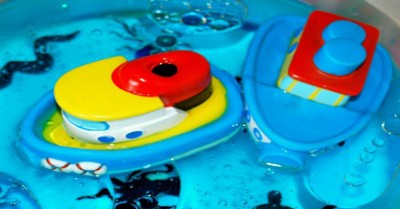Teach children about how oil spills happen, their effects on ocean habitats, and how difficult they are to clean up.
Materials:
To create the Ocean:
- large plastic tub
- water
- plastic boats
- blue food colouring
- sea creatures
olive oil (to add to pollute the water)
To experiment with to clean up the oil spill:
- spoon
- feather
- paper towel
- sponges
- soap
What to do:
- Set up a miniature ocean in a large plastic tub using the materials (except oil).
- After the child plays with their ocean, add a couple of tablespoons of olive oil to the water.
- The "ocean" in now polluted with oil.
- Encourage the child to think of ways to clean up the oil.
- Using different materials the child suggests, see if they can remove the oil.
- Add a little soap to see what happens.
- Discuss how difficult it is to clean up oil spills.
Hints and Tips:
- Discuss ocean animals and what happens when they get covered in oil.
- How birds cannot fly once they get covered in oil.
- How oil spills are cleaned up
- How to prevent oil spills from happening
- What else may harm the ocean animals
Reference:
Lively, Sue "Inspiring Kids To Protect Our ocean Oil Spill Activity", Onetimethrough, 30th April 2015.
